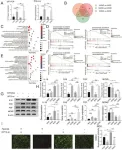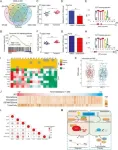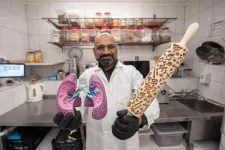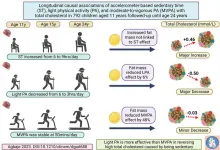(Press-News.org) A paper published today in JAMA Network Open addresses bias in healthcare algorithms and provides the healthcare community with guiding principles to avoid repeating errors that have tainted the use of algorithms in other sectors.
This work, conducted by a technical expert panel co-chaired by Marshall Chin, MD, MPH, the Richard Parrillo Family Distinguished Service Professor of Healthcare Ethics at the University of Chicago, supports the Biden Administration Executive Order 14091, Further Advancing Racial Equity and Support for Underserved Communities Through The Federal Government, issued on February 16, 2023. President Biden calls for Federal agencies to consider opportunities to prevent and remedy discrimination, including by protecting the public from algorithmic discrimination.
The technical expert panel was supported by the Agency for Healthcare Research and Quality (AHRQ) and the National Institute for Minority Health and Health Disparities at the National Institutes of Health (NIH) in partnership with the HHS Office of Minority Health and the Office of the National Coordinator for Health Information Technology.
“Healthcare algorithms, including those developed by artificial intelligence, have potential for great benefit and great harm. We know that biased algorithms have harmed minoritized communities in other fields such as housing, banking, education, and criminal justice,” Chin said.
The use of algorithms is expanding in many realms of healthcare, from diagnostics and treatments to payer systems and business processes. Every sector of the healthcare system is using these technologies to try to improve patient outcomes and reduce costs.
The panel developed a conceptual framework to apply the following guiding principles across an algorithm’s life cycle to address the problems of structural racism and discrimination, centering on healthcare equity for patients and communities as the overreaching goal:
Promote health and healthcare equity during all healthcare algorithm life cycle phases.
Ensure healthcare algorithms and their use are transparent and explainable.
Authentically engage patients and communities during all healthcare algorithm life cycle phases and earn trustworthiness.
Explicitly identify healthcare algorithmic fairness issues and tradeoffs.
Establish accountability for equity and fairness in outcomes from healthcare algorithms.
The technical expert panel reviewed evidence, heard from stakeholders, and received community feedback. Although algorithms are widely used and can offer value in diagnostics and treatments, not all individuals benefit equally from such algorithms, creating inequities. This is due primarily to biases that result in undue harm to disadvantaged populations, which perpetuates healthcare disparities and may violate civil rights protections. To rectify these issues, the healthcare community and the public must understand how using algorithms may lead to unintended biased outcomes, how to identify biases before implementation, and what to do with biases discovered after implementation.
“Algorithmic bias is neither inevitable nor merely a mechanical or technical issue. Conscious decisions by algorithm developers, algorithm users, the healthcare industry, and regulators can mitigate and prevent bias and proactively advance health equity,” Chin said.
The paper, Guiding Principles to Address the Impact of Algorithm Bias on Racial and Ethnic Disparities in Health and Health Care, may be found in JAMA Network Open. The journal also links to an accompanying podcast interview of panel co-chairs Marshall Chin, MD, MPH, and Lucila Ohno-Machado, MD, PhD, MBA.
END
Guiding principles to address bias in healthcare algorithms
2023-12-15
ELSE PRESS RELEASES FROM THIS DATE:
New insights into intervertebral disc degeneration: role of oxygen concentration and HIF1A in nucleus pulposus cells
2023-12-15
In a rapid communication published in the journal Genes & Diseases, researchers from Chongqing Medical University and Yongchuan Traditional Chinese Medicine Hospital of Chongqing have unveiled crucial insights into the factors that might influence Intervertebral Disc Degeneration (IDD). IDD is a predominant cause of lower back pain, impacting millions worldwide. The focus of this research revolved around nucleus pulposus cells (NPCs), pivotal in IDD, and how oxygen levels and the HIF1A gene could influence them. ...
Wnt pathway dysfunction influences colorectal cancer response to immunotherapy
2023-12-15
In a rapid communication published in the journal Genes & Diseases, has shed light on the role of the Wnt signaling pathway in influencing the immune response of colorectal cancer (CRC) patients. Researchers from Nankai University discovered that abnormalities in this pathway can affect a patient's response to immunotherapy, paving the way for more tailored treatment strategies. They integrated transcriptome data from 425 CRC patients, aiming to explore the underlying mechanism of MSI. They identified that the Wnt signaling pathway, essential for various cellular processes, showed signs of inhibition in MSI patients. The team also noted a significant down-regulation in mismatch repair ...
Molecular trap and zap
2023-12-15
Patients struggling with some chronic diseases often must wait years for a proper diagnosis. For example, symptoms such as shortness of breath can be attributed to many pulmonary as well as cardiovascular disorders, so patients may be treated for a misdiagnosed disease that is far from accurate diagnosis and treatment. Therefore, one of the most promising methods to deal with this problem is to track the levels of specific compounds in the body during the development of a specific disease. Moving in this direction, scientists at the Institute of Physical Chemistry of the Polish Academy of Sciences (Warsaw, Poland) and the National ...
New method paves the way for new antibiotics
2023-12-15
“Antimicrobial resistance is a major problem, and being able to help solve it is really great,” says Amanda Holstad Singleton, a PhD candidate at the Norwegian University of Science and Technology (NTNU).
Singleton is the lead author of a study that shows how a combination of two new substances effectively kills methicillin-resistant Staphylococcus aureus (MRSA).
These substances have been developed at NTNU and may become a completely new antibiotic that is effective against a wide group of bacteria.
“It's ...
Frontiers for Young Minds and CERN ‘SPARK’ big questions in health technology
2023-12-15
Frontiers for Young Minds, the award-winning, open-access scientific journal for kids, has published the first articles in a new collection in collaboration with CERN, one of the world’s largest centers for scientific research. The collection, entitled SPARK-ing big questions: what is the future of health technology?, addresses key questions on how ground-breaking health technologies and science can improve human health for future generations.
The articles are written by researchers who attended the SPARKS! Serendipity Forum at CERN in 2022, an event for scientific and ...
Role of cleaning fishes in conserving biodiversity distinguished with FLAD Science Award Atlantic 2023
2023-12-15
José Ricardo Paula, researcher at the Marine and Environmental Sciences Centre, Faculty of Sciences of the University of Lisbon (Portugal), will receive 300.000 euros in funding in three years to develop a project that aims to improve the understanding of the role of cleaning mutualisms in the conservation of Atlantic biodiversity, using emerging technologies, such as artificial intelligence.
In the global ocean, there are several fish species, known as cleaners, that specialize in providing ...
GYA and 30 Young Academies and Associations release statement suggesting actionable steps to connect fundamental science with sustainable development
2023-12-15
GYA and 30 Young Academies and Associations release statement suggesting actionable steps to connect fundamental science with sustainable development during Closing Ceremony of IYBSSD meeting
In a collective statement endorsed by 30 Young Academies and Associations, the Global Young Academy (GYA) underscored the pivotal role of fundamental science in achieving the United Nation Sustainable Development Goals (UN SDGs). The statement (link here) was delivered during the closing ceremony of the International Year of Basic Sciences for Sustainable Development (IYBSSD) at CERN in Switzerland on 15 December 2023.
The joint statement acknowledges the historical ...
Brief teacher training better prepares medical students for patient education & communication
2023-12-15
(Boston)—Teaching is an integral communication skill central to the practice of medicine. The art of teaching extends beyond disseminating information. The skill directly translates to health provider-patient communication, the success of which is positively correlated with improved patient outcomes.
“Teaching is a large part of medicine - patient education is critical to providing high quality patient centered care. Education helps patients understand the 'why' and 'what' of their treatments and allows them to be better participants in their ...
Local Philadelphia area business owner recognized as national champion for health equity
2023-12-15
DALLAS, December 15, 2023 — Devon Mitchell, an American Heart Association local volunteer and franchise owner at Anytime Fitness in Delaware, is the 2023 National Leaders of Impact™ Winner. Mitchell, one of the 295 leaders in cities across the country, worked to improve heart health in his community while raising funds to fuel the mission of the Association. The Leaders of Impact campaign pairs community leaders in a head-to-head competition to support the health equity work of the American ...
Childhood sedentariness causes elevated cholesterol but light physical activity may neutralize it
2023-12-15
Increased sedentary time from childhood through young adulthood significantly increased cholesterol levels in a new follow-up study. However, the results also showed that light physical activity (LPA) may completely reverse the adverse process. Moderate-to-vigorous physical activity (MVPA) may also reduce cholesterol levels, but its effect is diminished by body fat. The study was conducted in collaboration between the University of Bristol in the UK, the University of Exeter in the UK, and the University of Eastern ...







